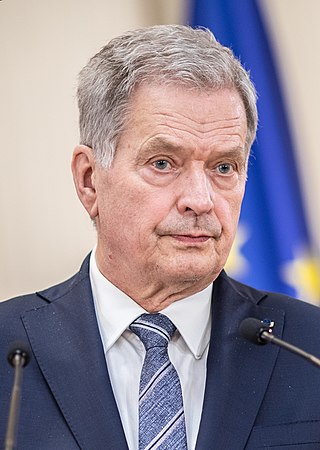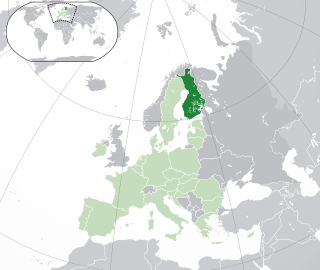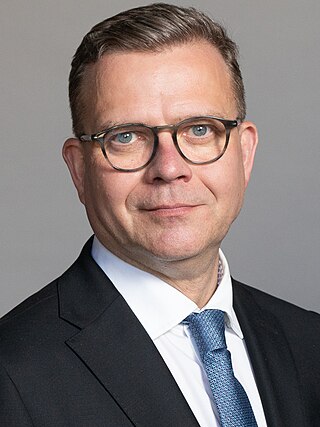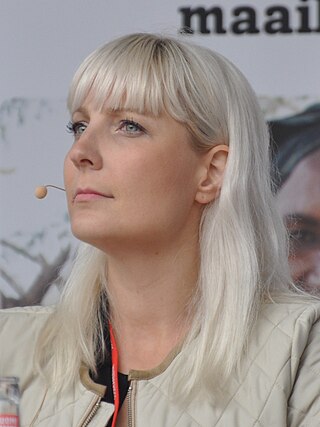| |||||
| Decades: | |||||
|---|---|---|---|---|---|
| See also: | |||||
The year 2017 is the centenary of the independence of Finland.
| |||||
| Decades: | |||||
|---|---|---|---|---|---|
| See also: | |||||
The year 2017 is the centenary of the independence of Finland.
| | This section needs expansion. You can help by adding to it. (August 2017) |

Mauno Henrik Koivisto was a Finnish politician who served as the ninth president of Finland from 1982 to 1994. He also served as the country's prime minister twice, from 1968 to 1970 and again from 1979 to 1982. He was also the first member of the Social Democratic Party to be elected as President of Finland.
The National Coalition Party is a liberal-conservative political party in Finland. It is currently the largest and the governing political party of Finland.

The Centre Party, officially the Centre Party of Finland, is an agrarian-centrist political party in Finland. Ideologically, the Centre Party is positioned in the centre of the political spectrum. It has been described as liberal, social-liberal, liberal-conservative, and conservative-liberal. The party’s leader is Antti Kaikkonen, who was elected in June 2024 to succeed former minister Annika Saarikko. As of June 2023, the party has been part of the parliamentary opposition.

The Finns Party, formerly known as the True Finns, is a right-wing populist political party in Finland. It was founded in 1995 following the dissolution of the Finnish Rural Party.

Sauli Väinämö Niinistö is a Finnish politician who served as the 12th president of Finland from 2012 to 2024.

Heikki Ritavuori was a Finnish lawyer, a politician from the National Progressive Party, a member of the Parliament of Finland and Minister of the Interior. He was the closest colleague of President K. J. Ståhlberg and was Minister of the Interior in J. H. Vennola's first and second cabinets from 1919 to 1922 for a total of 526 days. Heikki Ritavuori is a unique figure in Finland's political history because he is not remembered for his life's work, but instead for its end. Minister Ritavuori was shot dead at the door to his home in Helsinki in February 1922.

Lesbian, gay, bisexual, transgender, and queer (LGBTQ) rights in Finland are among the most advanced in the world. Both male and female same-sex sexual activity have been legal in Finland since 1971 with "promotion" thereof decriminalized and the age of consent equalized in 1999. Homosexuality was declassified as an illness in 1981. Discrimination based on sexual orientation in areas such as employment, the provision of goods and services, etc., was criminalized in 1995 and discrimination based on gender identity in 2005.

Pekka Olavi Haavisto is a Finnish politician of the Green League who served as the Minister for Foreign Affairs from 2019 to 2023.

Finland and the United States currently have good relations. The United States recognized Finland on May 7, 1919 after it declared independence in 1917, and officially established diplomatic relations in 1920. Due to World War II and Soviet pressure, relations were suspended between 1942 and 1945 before being raised to embassy level in 1954. Finland has been of strategic importance to the United States due to its position bordering the Soviet Union and later Russia, and after the end of the Cold War in 1991 Finland's shift to the West has led to warmer relations. There is significant trade activity, including military procurement, between the two countries.
The Note Crisis was a political crisis in Soviet–Finnish relations in 1961. The Soviet Union sent Finland a diplomatic note on 30 October 1961, referring to the threat of war and West German militarization and proposing that Finland and the Soviet Union begin consultations on securing the defence of both countries, as provided for in the Finno-Soviet Treaty of 1948. The note coincided with the detonation of the Tsar Bomba, the most powerful nuclear test in history, and followed close on the heels of the Berlin Crisis and Bay of Pigs Invasion.

Parliamentary elections were held in Finland on 17 April 2011 after the termination of the previous parliamentary term. Advance voting, which included voting by Finnish expatriates, was held between 6 and 12 April with a turnout of 31.2%.

Antti Petteri Orpo is a Finnish politician currently serving as the prime minister of Finland since 2023 and as the leader of the National Coalition Party since 2016. He briefly served as speaker of the Parliament of Finland after the 2023 parliamentary election.

Parliamentary elections were held in Finland on 14 April 2019. For the first time, no party received more than 20% of the vote. The Centre Party, which had been the largest party following the 2015 elections, dropped to fourth place, losing 18 seats and recording its lowest vote share since 1917. The Social Democratic Party saw the biggest gains, winning six more seats and narrowly becoming the largest party for the first time since 1999. The Green League and the Left Alliance also gained five and four seats respectively.

Presidential elections were held in Finland on 28 January 2018. The incumbent Sauli Niinistö received 63% of the vote and was re-elected for a second term, avoiding a second round. He received a plurality of the vote in every municipality and a majority in all but 13 municipalities.

Li Sigrid Andersson is a Finnish politician who served as Minister of Education from 2019 to 2023. A former leader of the Left Alliance, she was a Member of Parliament from 2015 to 2024. She is also a city councillor of Turku and was chair of the party's youth wing, Left Youth.

The 2017 Finnish government crisis followed the Finns Party leadership election held on 10 June 2017. Prime Minister Juha Sipilä and Minister of Finance Petteri Orpo announced on 12 June that they would no longer cooperate in a coalition government with the Finns Party after Jussi Halla-aho was elected party chairman. The crisis resolved on 13 June when twenty MPs defected from the Finns Party's parliamentary group, forming what would eventually become the Finnish Reform Movement party. Sipilä's government retained a majority in Finland's parliament as the Finnish Reform Movement continued as a member of the coalition.

The 2017 Turku attack took place on 18 August 2017 at around 16:02–16:05 (UTC+3) when 10 people were stabbed in central Turku, Southwest Finland. Two women were killed in the attack and eight people sustained injuries.

The Night Frost Crisis or the Night Frost was a political crisis that occurred in Soviet–Finnish relations in the autumn of 1958. It arose from Soviet dissatisfaction with Finnish domestic policy and in particular with the composition of the third government to be formed under Prime Minister Karl-August Fagerholm. As a result of the crisis, the Soviet Union withdrew its ambassador from Helsinki and put pressure on the Finnish government to resign. The crisis was given its name by Nikita Khrushchev, who declared that relations between the countries had become subject to a "night frost".

In Finland, the far right was strongest in 1920–1940 when the Academic Karelia Society, Lapua Movement, Patriotic People's Movement (IKL) and Vientirauha operated in the country and had hundreds of thousands of members. In addition to these dominant far-right and fascist organizations, smaller Nazi parties operated as well.

Maija Riitta Perho is a Finnish politician. She represented Varsinais-Suomi in the Parliament of Finland from 1991 to 2007 as a member of the National Coalition Party. From 1999 to 2003, she was Finland's minister of social affairs and health in the cabinet of Prime Minister Paavo Lipponen.